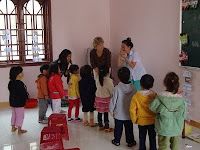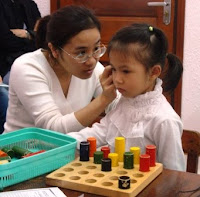The teachers here are loving and caring about the children they serve. The expertise is limited though with many of the teachers self-taught or learning from short courses and each other. Nevertheless, they were anxious to learn new teaching strategies and immersed themselves in Judy and Lea’s teaching with full enthusiasm.
The typical instruction in the classrooms for small children was taught by rote — a teacher would stand in front of the classroom and have the children repeat a series of sentences after her such as “Nina is crying”…”Why is N ina crying?”…””She is crying because she is sad”. Such lessons didn’t take advantage of real life, present opportunities to learnto listen, develop language, nor were they tied to any lesson plan or specific objective or goal. Worse, the children looked bored and uninterested.
ina crying?”…””She is crying because she is sad”. Such lessons didn’t take advantage of real life, present opportunities to learnto listen, develop language, nor were they tied to any lesson plan or specific objective or goal. Worse, the children looked bored and uninterested.
Judy and Lea mentored teachers through lecture and practicum, coaching them on a variety of auditory-verbal strategies for children with hearing loss including how to identify goals, assess cognitive and language skills, and use approaches to address weakness areas.
Judy offered suggestions to the teacher she was working with and helped transform her classroom. One day, they led a whole session together about different kinds of animals, the sounds they make and the things they do. Judy, the teacher, and children were flying around the room like birds, jumping like kangaroos, etc. It was engaging and provided elements to practice listening. The kids loved it and were shouting out different ideas about what the animals do. The teacher was positively glowing too.
While Lea and Judy were mentoring teachers, Jane and Joanne counseled famlies about their childen’s hearing acumen and fit hearing aids on those who needed them. The school’s staff person who doe s audiology work here and an ENT doctor from Hanoi shadowed them. By the end of our time at Thanh Tan, they were both more astute at testing hearing and fitting hearing aids. They should be able to apply their new knowledge after we leave. I invited the ENT doctor to join our summer training at Thuan An Center and she enthusiastically accepted.
s audiology work here and an ENT doctor from Hanoi shadowed them. By the end of our time at Thanh Tan, they were both more astute at testing hearing and fitting hearing aids. They should be able to apply their new knowledge after we leave. I invited the ENT doctor to join our summer training at Thuan An Center and she enthusiastically accepted.
We hosted parent meetings on each of three evenings for the parents of Thanh Tan. They came in droves with the room packed with about 50 people every night- a wonderful testment to the desire of the parents to find out what they needed to know to help their children listen and develop spoken language.
Last night was our final parent meeting – a 2-hour Q and A session. The questions yet again shed light on the widespread gaps of service that currently exists in Vietnam for children with hearing loss and their families. A parent was concerned about her daughter’s progress in mainstream school after leaving Thanh Tam in an environment of large classrooms and no special support. Parents asked myriad questions about hearing technology and language milestones that reflected a need for audiology services . There are many that have been waiting for months for hearing parts to arrive at the dispenser for their children’s broken hearing aids. Meanwhile, their children go without and lose precious time for developing auditory skills.
I offered some of my personal experience as someone who grew up with a profound hearing loss in mainstream schools. I shared that its difficult for me to hear the news on the radio and I know I miss ambient conversation. So, my love for reading helped me with vocabulary and awareness of the wider world. Reading has been a real equalizer in the acquisition of knowledge and information. I also suggested that parents find and cultivate that talent that is innate in every child. Doing so helps with self-esteem, friendships, and provides an identity that has nothing to do with the hearing loss. The world is a big, exciting place with much to see and do. Get out and explore and experience it all with their children. The richer the life experience, the easier it is to transcend hearing loss and find those talents and interests. Finally, I encouraged the parents to believe in their children and their potential to learn to listen and talk. Help them aspire to be the best they can be.
The Thanh Tam school is a loving, warm environment and we were treated very well. The sisters were always looking out for us. They took us around to see the sights and fed us with way too much good food. The banter was easy and we all became fast friends. It made for a wonderful stay. The sisters, families, and teachers repeatedly appealed to us to come back and help them continue to develop their early intervention program. Our team agreed there is great potential here and we were grateful for the opportunity to help them out for a few days.